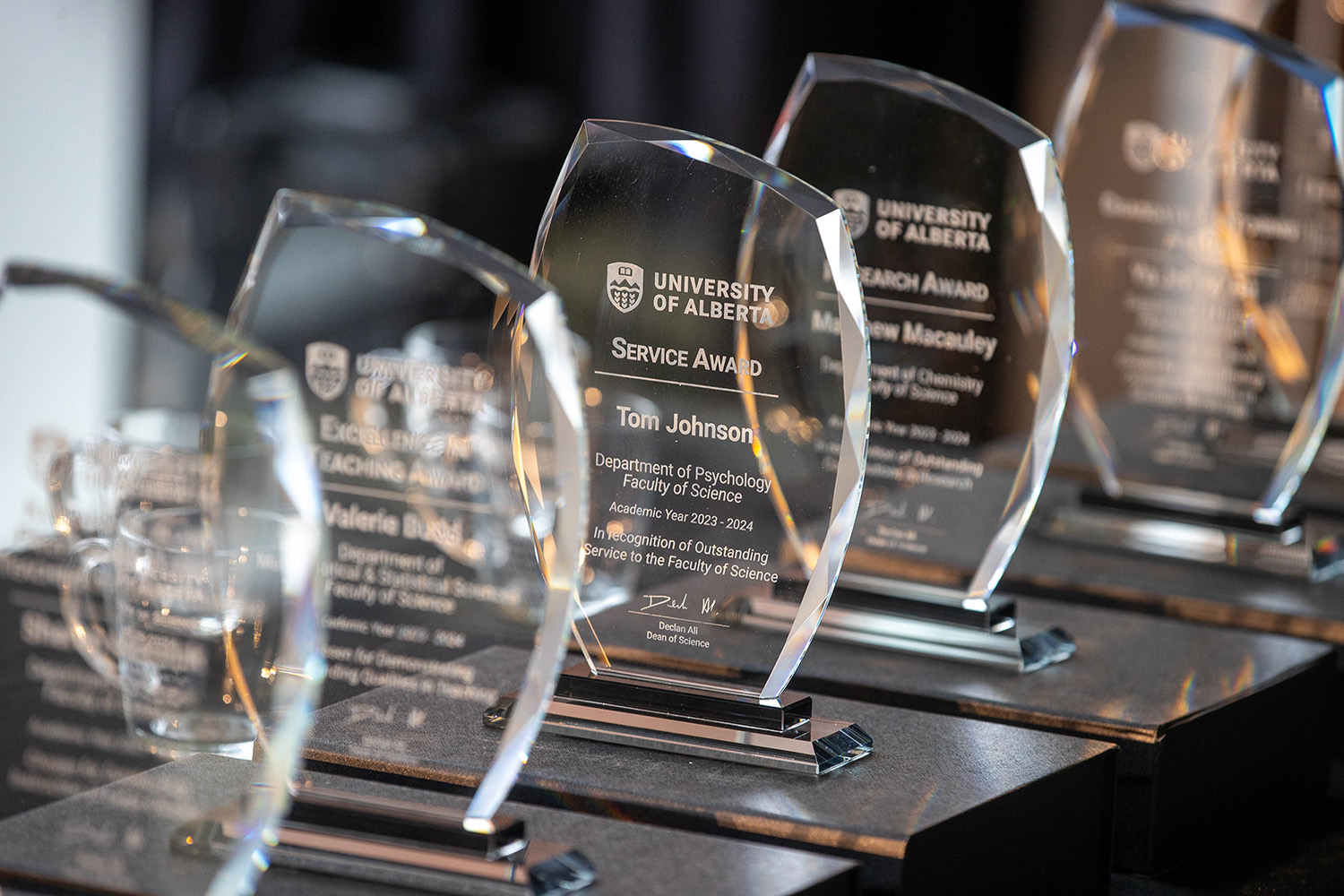
The awards of the 2024 Celebration of Excellence in Teaching and Research, an annual tradition that honours our exceptional faculty and staff. Photo credit: Curtis Comeau Photography
Each year, the Faculty of Science honours our exceptional faculty and staff at the Celebration of Excellence in Research and Teaching.
This celebration is an opportunity for us to acknowledge the outstanding work of our faculty and staff members and recognize particular achievements of some of our community members over the past year.
The hard work of the 2023-2024 award recipients and of the entire Faculty of Science community has made another academic year a success, and continues to support our mission of world-leading research and inspired teaching and training of the next generation of scientists.
“Today is an opportunity to celebrate the incredible work of this community in general and to share our appreciation for all that you do,” said Declan Ali, dean of the Faculty of Science. “It’s also an opportunity for us to pay special recognition to some of our colleagues who have gone above and beyond in their research and teaching. Thank you for all that you do.”
Please join us in congratulating the award recipients on their embodiment of the Faculty of Science’s core values, and thank you to those who were able to provide a few additional comments about their research and teaching.
Quick jump to award recipients:
- Tom Johnson, Service Award (Faculty category)
- Sharon Morsink, Kathleen W. Klawe Prize for Excellence in Teaching of Large Classes
- Valerie Budd, Excellent Teaching Award
- Matthew Macauley, Research Award
- Yu Jeffrey Gu, Graduate Mentoring Award
- Gerda de Vries, EDI Award
The Associate Dean of Learning and Innovation Besties (ADLIB) for:
- Rebekah McKinnon, Biological Sciences
- Jason Cooke, Chemistry
- Matthew Guzdial, Computing Science
- Neal Lamontagne, Earth & Atmospheric Sciences
- Gregory Wagner, Mathematical & Statistical Sciences
- William Morrish, Physics
- Jeremy Caplan, Psychology
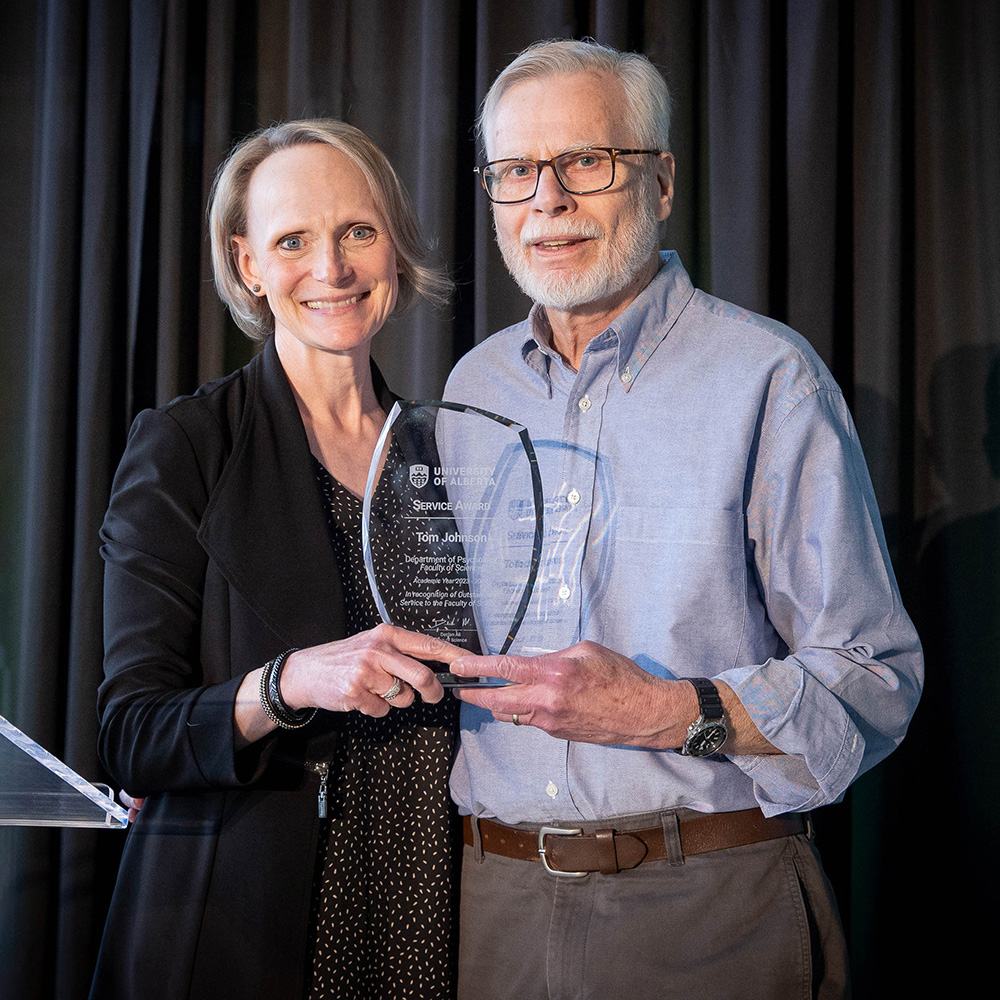
Tom Johnson, Service Award (Faculty category)
Tom Johnson, faculty services officer in the Department of Psychology, received a Service Award in recognition of outstanding service to the Faculty of Science.
- Tell us a bit about your work in the Department of Psychology. What does your day-to-day work include?
Since joining the Department of Psychology and the Faculty of Science in 1999 my primary role has been to provide technical support for department research and teaching, including IT support, shop management, and lab space support and development. In this role I have frequently collaborated on projects with Science, IST, and the university to develop IT and research services, and with psychology and the faculty on network upgrades, teaching lab updates and new lab development. For teaching support, I have taught undergraduate statistics courses and participated in graduate student ethics seminars, and I supervised technology intern students funded through science for a number of years. I also work with our research participation program to support the lab component of introductory psychology courses. For other service, I worked with ethics committees and the Science ITOC committee for a number of years, and I am currently working with Science and Facilities on Zoology renovations and IT projects.
In all cases I have very much enjoyed and appreciated working with our excellent staff and students in psychology, science and across the university. I am grateful for the assistance and support of our excellent and dedicated department technical team. - What do you enjoy most about working in your department?
This is a tough question as I can’t think of anything I do not like about working in psychology — but overall it would have to be working on projects with our technical group on IT development and research support projects, working with excellent staff, and the friendships and good working relations that I have developed over the years. - What was your reaction when you found out you were receiving this award? What does this recognition mean to you?
I was very pleased to learn I had been nominated for the Faculty of Science Service Award by psychology, but was initially shocked and excited to learn that I received the award. It’s very gratifying to have my work recognized by my department and the Faculty of Science, and I am grateful and honoured to have received this award.
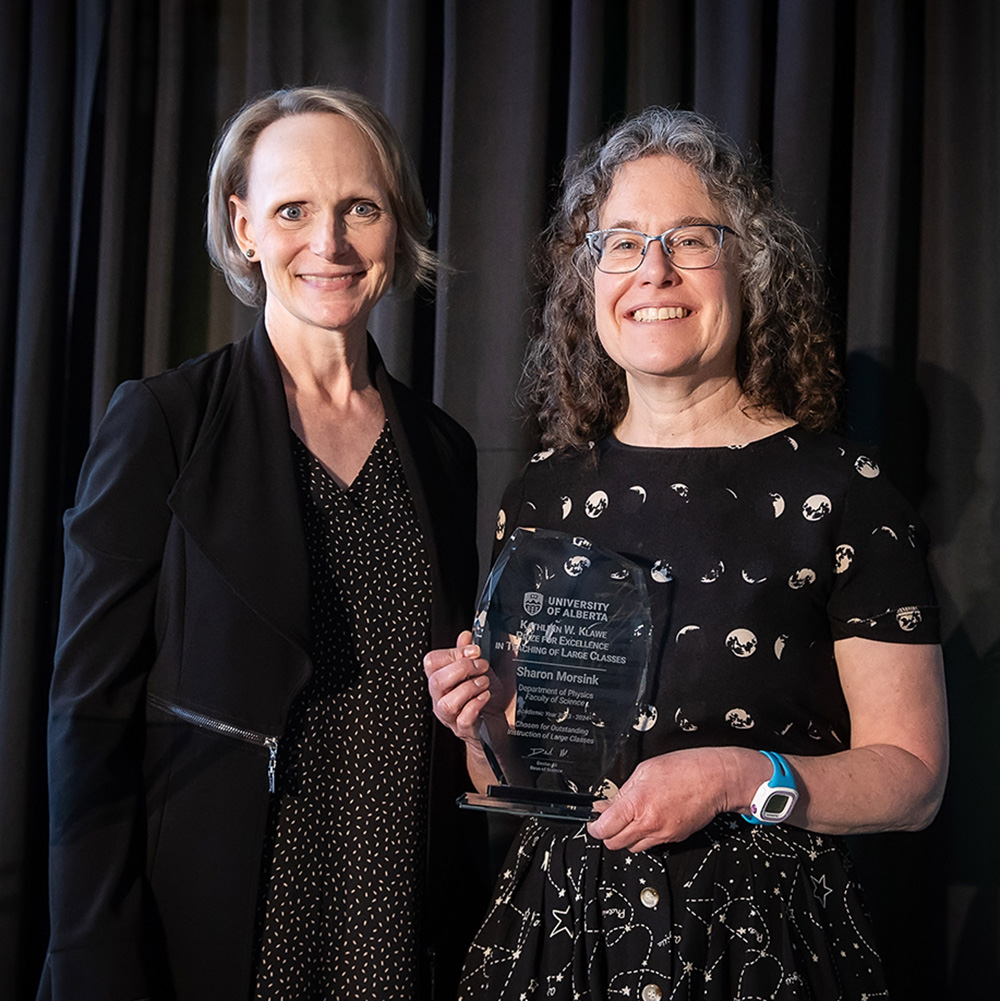
Sharon Morsink, Kathleen W. Klawe Prize for Excellence in Teaching of Large Classes
Sharon Morsink, professor in the Department of Physics, received the Kathleen W. Klawe Prize for Excellence in Teaching of Large Classes, chosen for outstanding instruction of a large class.
- Tell us a bit about what you teach. Why is it important for students to study this subject?
I teach courses in physics and astronomy. Astronomy addresses the question of our place in the Universe. We use physics to explain how the stars and planets formed and predict how they will change in the future. Many fascinating, but difficult-sounding topics, such as black holes, can be understood by undergraduate students. Along the way, students can learn about important concepts, such as how the Sun creates the energy required for life on Earth. . - What is your philosophy when it comes to teaching the next generation of scientists?
When thinking about how to explain a complicated subject, it's important to think carefully about what smaller pieces of knowledge are required in order to understand the bigger picture. I also think that it's important for students to learn that science is all about discovery, and that we don't know the answers to all of the questions.
Astronomy is a field of study with lots of unknowns, and I think that students find it eye-opening to find out that there are still so many unanswered questions about the Universe. I like to make sure that students gain the tools that help them to tackle new problems, whether the issues are in astronomy or more practical applications of science. - What was your reaction when you found out you were receiving this award? What does this recognition mean to you?
I was both touched and surprised. It is nice to have hard work recognized, and I was surprised that students would say such nice things about their experiences in my courses! I am also grateful for the support from the Department of Physics and the Faculty of Science when I was developing the course Astro 101.
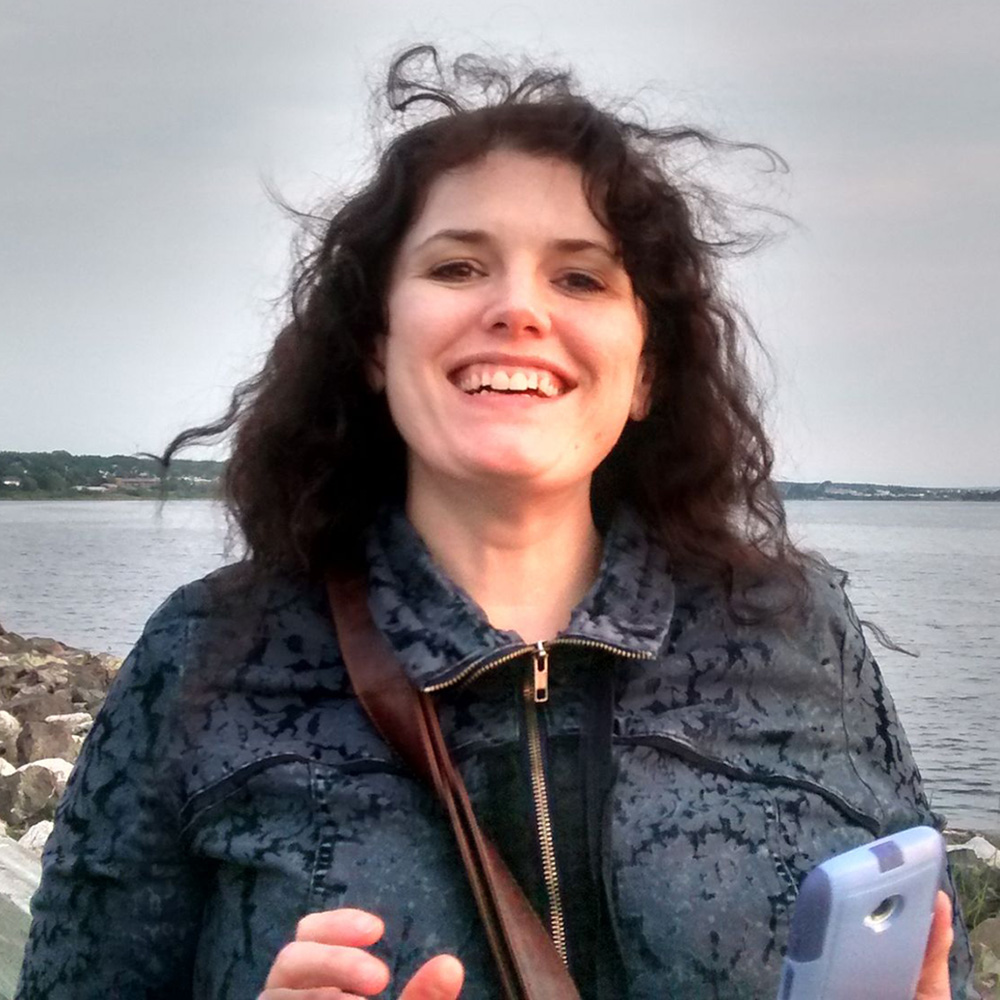
Valerie Budd, Excellent Teaching Award
Valerie Budd, assistant lecturer in the Department of Mathematical and Statistical Sciences, received the Excellence in Teaching, chosen for demonstrating outstanding qualities in teaching.
- Tell us a bit about what you teach. Why is it important for students to study this subject?
I teach courses in the Department of Mathematical and Statistical Sciences, including linear algebra, calculus and statistics classes. Mathematics and statistics play key roles in technology, scientific discovery, business, government policy, and many other aspects of society. Beyond the fundamental importance of the material, studying math and stats helps students to develop essential skills. The skills that likely come to most people’s minds are logical reasoning, problem solving, attention to detail, and accuracy, but there are many others. Attempting mathematical proofs teaches students how to organize their thoughts, create strong arguments, and effectively and precisely communicate ideas. As mathematics can be challenging, studying math can help students to cultivate dedication, patience, and perseverance.
At its higher levels, mathematics is an elegant art form that demands as much creativity as it does logic. I would argue that the beauty of mathematics is a reason on its own to study the subject. When I first started graduate studies, I found it amusing how affectionately mathematicians described their results in the introductions of their research papers and I would jokingly think to myself, “Am I reading a math paper or love poem?”. It didn’t take long for me to realize that it was, in fact, love poetry. Mathematics is truly a remarkable and beautiful subject, and I hope that my students get to experience it as such. - What is your philosophy when it comes to teaching the next generation of scientists?
As someone who teaches math and stats, I’ll admit that I don’t teach the most popular or well-liked of subjects. Mathematics and statistics are frequently perceived as being uninteresting, incomprehensible, and inaccessible. Mathematical illiteracy is, at times, socially celebrated. Furthermore, it is all too common for students to have negative experiences in their mathematics education. This often leads to an unfavourable view of the subject, together with anxiety, in combination with self-doubt when faced with learning or using mathematics. Guiding students to a genuine understanding of the material, nurturing students’ interest in mathematics, and helping students overcome the legacy of any negative mathematics–related experiences are the foundations of my enthusiasm for and commitment to teaching math and stats.
I believe it is crucial for an instructor to be patient, approachable, encouraging, and enthusiastic about the subject, so that students feel comfortable seeking assistance and associate doing mathematics with positive experiences. In class, I strive to create a light-hearted atmosphere, injecting humour where possible, and to foster a sense of openness, so that students feel comfortable to ask questions and contribute to discussions. I also think that one key to effective teaching lies in an instructor’s ability to convey information at a level that is simple enough to be accessible, but sophisticated enough to promote interest and further exploration in the area. This is no easy feat, but is essential to addressing the diversity of student needs and abilities during a course.
In my opinion, the most effective way to learn mathematics is to do mathematics. Individual practice is the most crucial component of the learning process and, as such, I make sure that my students have ample opportunity to work with the material. I feel it is important for student engagement with the subject matter to begin with simple problems. This ensures that students develop a strong grasp of the fundamentals upon which to build their knowledge, while boosting confidence in their ability to do mathematics. At the same time, challenging problems are imperative to guide students beyond rote learning and develop critical thinking skills. Furthermore, I think we learn more from our mistakes than we do our triumphs, and as such, I believe that students should be given a place to learn without the fear of making errors. One way that I have implemented this in my teaching is to give students unlimited attempts at online homework problems before the due date. The opportunity to try something until one gets it right is an essential part of the learning process. - What was your reaction when you found out you were receiving this award? What does this recognition mean to you?
I was quite touched when I found out about the award. Indeed, tears welled up in my eyes as I was reading the notification email. I feel very fortunate to have a job in which I get to enjoy two of my great passions: mathematics and teaching. I care about my students and their success, so I put a lot of time and effort into teaching. It is, indeed, nice to be recognized.
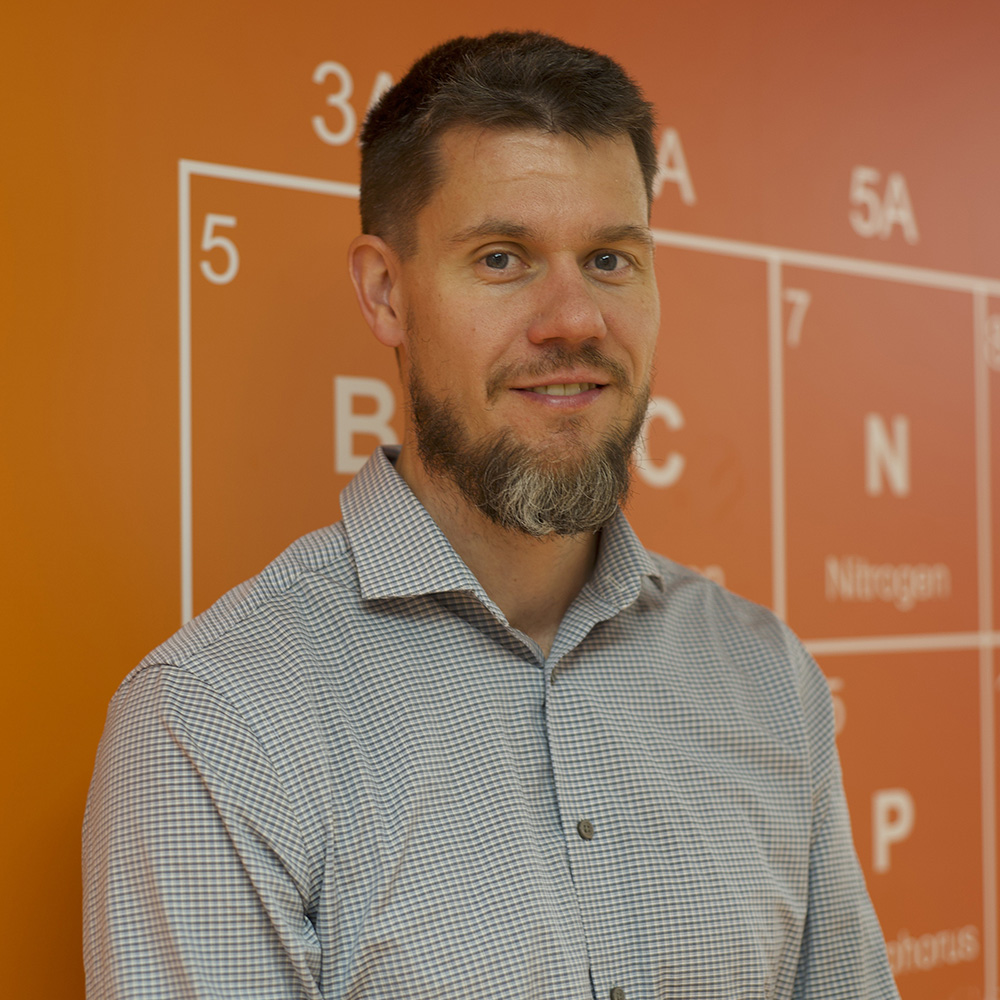
Matthew Macauley, Research Award
Matthew Macauley, associate professor in the Department of Chemistry, received the Research Award, in recognition of outstanding contributions in research.
- Tell us a bit about your role. What does your day-to-day work look like?
My lab studies carbohydrate binding receptors, called Siglecs, that are on our immune cells. Through recognition of carbohydrates, known as glycans, they help control immune cells. This is important because inappropriate control of immune cells is linked to many diseases, such as cancer, neurodegeneration, and autoimmunity. - What is your philosophy when it comes to teaching the next generation of scientists?
Immunotherapies aim to target our immune cells to achieve a therapeutic benefit. There is a lot of excitement about targeting Siglecs in immunotherapy, some of which we are involved in. However, to give us the best chance of accomplishing this, we need more fundamental research about what Siglecs are doing and precisely what the carbohydrates that they recognize. - What was your reaction when you found out you were receiving this award? What does this recognition mean to you?
My reaction is that I was incredibly happy for my laboratory. I consider this a success of the entire lab and not just a single individual. Science is filled with plenty of setbacks along the way, so it is nice to celebrate this with them.
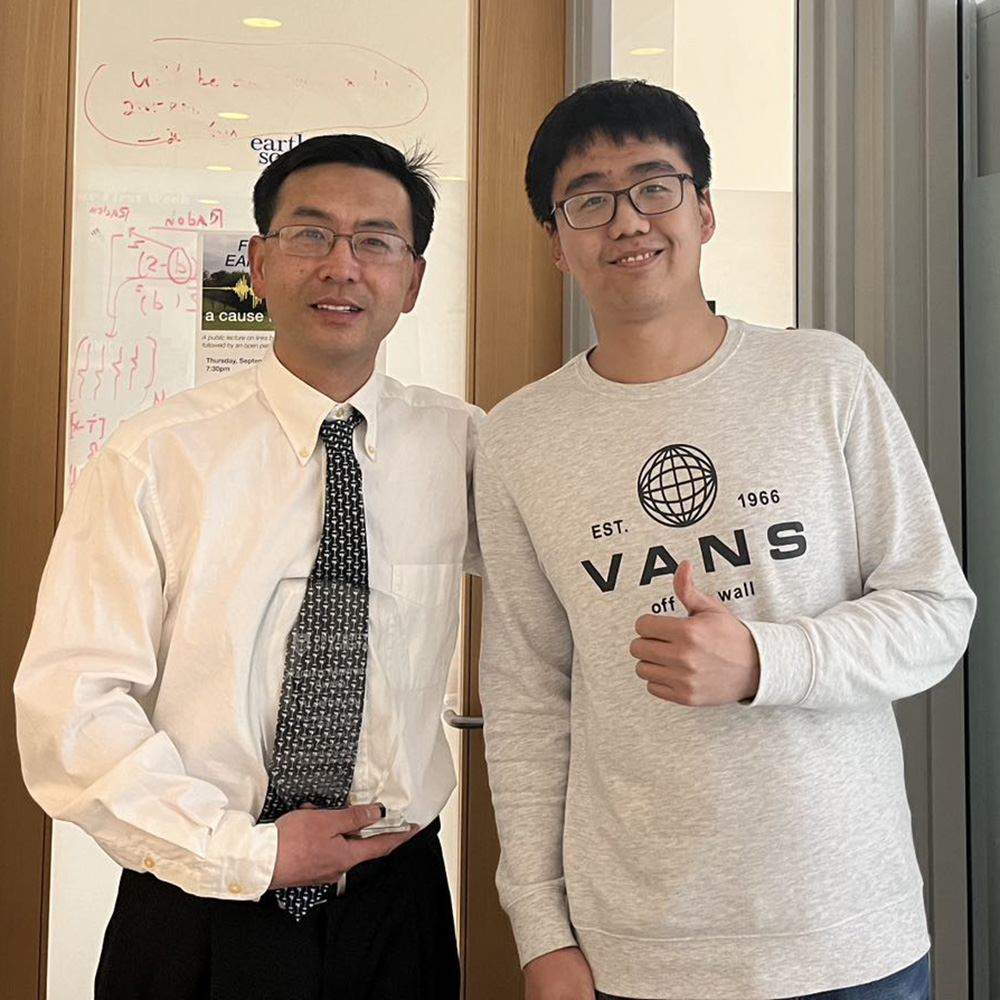
Yu Jeffrey Gu, Graduate Mentoring Award
Yu Jeffrey Gu, professor in the Department of Physics, received the Graduate Mentoring Award, chosen for demonstrating outstanding qualities in graduate student mentorship.
- Tell us a bit about your mentorship of your graduate students. What makes this area of study important?
For the past two decades, my students and I have focused on the understanding of earthquakes, whether they are natural or 'man-made', and the Earth's internal structures down to great depths. This area of study is important since earthquakes can cause major property damages, even loss of lives. By analyzing the circumstances behind their occurrences, we can, to varying degrees, help mitigate the risks associated with them. Earthquake records also offer an effective window into the structure, composition and processes at depths well beyond those reachable by drilling. - What is your philosophy when it comes to teaching the next generation of scientists?
There are considerable differences between 'teaching' and 'mentoring' in my view. For teaching, its main purpose is to transfer what I know to students in an effective manner. To me, mentoring is more about a two-way partnership between my students and I. In most cases, I learn from the experience of working with graduates just as much as they learn from me, and we both benefit from every bit of their own successes. Because of this partnership, honesty, respect and effective communications — the bedrocks of every collaborative working environment, are essential in my opinion.
I value students' honesty in data handling and reporting, and in return I try to be as honest and straight-forward as possible in my assessment of their work. Even if my assessment sometimes comes across as harsh, I find today's students to be mature individuals (with thicker skin than students in my generation) who can take criticism in stride, as long as they know that you have their best interests in heart. Also, every student is unique in their past training, personality and ability, so I try to be adaptive to their individual needs and circumstances. But ultimately, respect is the key for me. I try to earn their respect by working alongside them, and by respecting their own space and their prowess in today's technologies. They also appreciate it when I own up to my own missteps, and frequent tardiness, in these collaborative projects. I feel really fortunate that the vast majority of my students have been high quality individuals with great honesty and understanding. - What was your reaction when you found out you were receiving this award? What does this recognition mean to you?
It was a big surprise since I had no idea that an application was put together on my behalf by my students. I am truly grateful to my students, and to the faculty for the selection. This award is by far the most meaningful award in my career since, despite all my flaws and failings, it feels great knowing that I did something right and made a positive impact along the way. To me, this award is more of a celebration of students' positive 'U of A experience', a culmination of their own talent, diligence, and the nurturing environment set up by the geophysics program and the department. It is quite humbling since I was given the bulk of the credit for being only a small part of students' overall successes and enjoyments at the U of A and beyond.
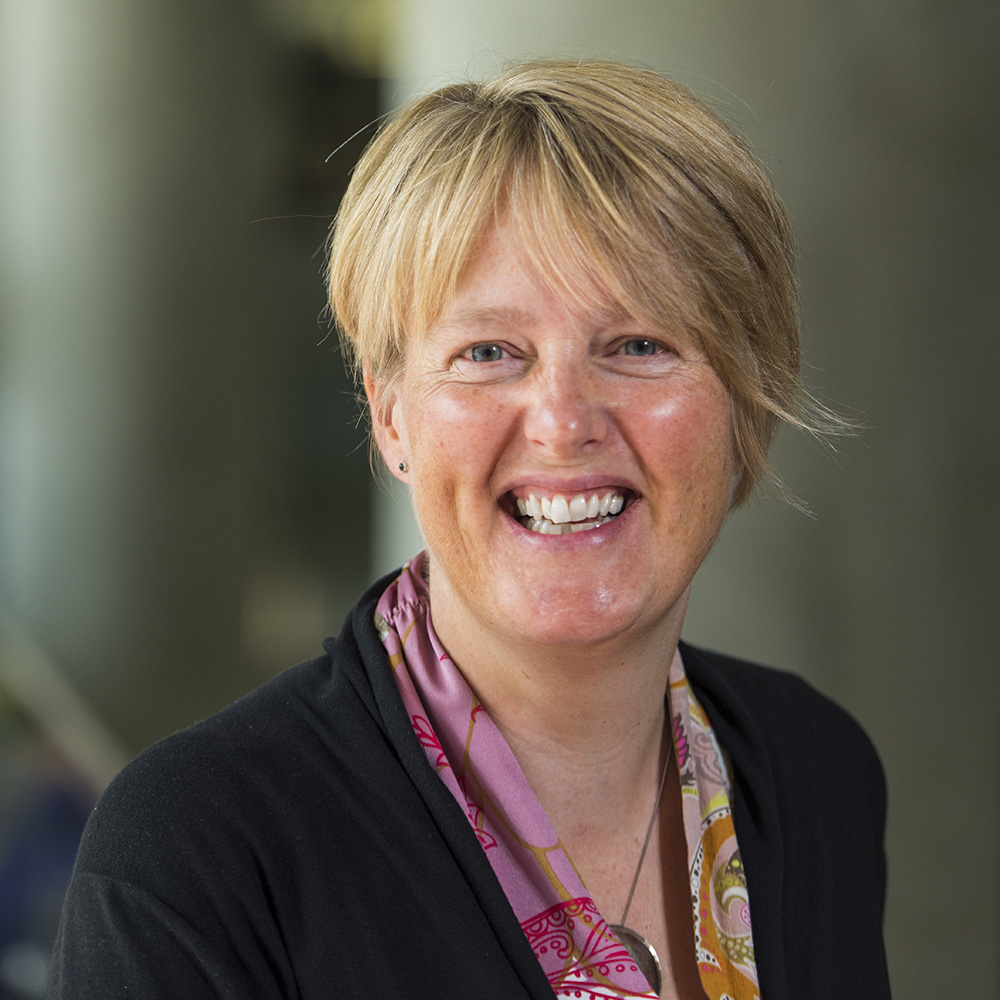
Gerda de Vries, EDI Award
Gerda de Vries, associate dean (undergraduate) and professor in the Department of Mathematics and Statistical Sciences, received the EDI Award for demonstrating outstanding commitment to EDI values.
- What aspect of your work was recognized with the Faculty of Science EDI Award?
The award recognizes the work I carried out in my role as Associate Dean (Undergraduate) to eliminate minimum course load requirements from Faculty of Science regulations. Many of our undergraduate students are unable to carry a specific minimum course load every Fall/Winter due to a large variety of life circumstances (financial constraints, disability, family status, illness, etc.). While these students may excel academically, they were significantly impacted by minimum course load requirements embedded in Calendar regulations. For example, students unable to complete at least 24 units of course load in Fall/Winter for whatever reason were unable to continue in many of our programs unless they appealed for special consideration of their circumstances. Also, students unable to complete at least 24 units in Fall/Winter were ineligible for the annual honorific of First Class Standing (also known as the Dean’s Honor Roll) and the graduation honorifics of With Distinction and First Class Honors, regardless of their academic performance. The elimination of minimum course load requirements from Faculty of Science policies and regulations leads to a more equitable treatment of our undergraduate students. - What is the impact of this work on students?
The elimination of the minimum course load requirements means that our students can no longer be excluded from participating in our programs or receiving an honorific for excellent academic performance simply because they are unable, because of their life circumstances, to carry a specified minimum course load. Students now can complete any of our programs at a pace that best fits their life circumstances without fear of losing their spot in the program. Science at the University of Alberta, therefore, is more accessible to more students. - What does receiving the Faculty of Science EDI Award mean to you?
I view the award as a poignant reminder and encouragement to continue the much-needed work of reviewing long-standing regulations and practices with an EDI lens, and revising them as necessary to ensure that all students, regardless of life circumstances, are treated equitably.
The Associate Dean of Learning and Innovation Besties (ADLIB) Awards
Each year, each department is asked to identify an instructor that embodies a particular quote in their teaching. This year's ADLIBs embody the following quote by Dr. Seuss:
"Think left and think right and think low and think high. Oh, the thinks you can think up if only you try!"
This year’s annual ADLIB honorees are:
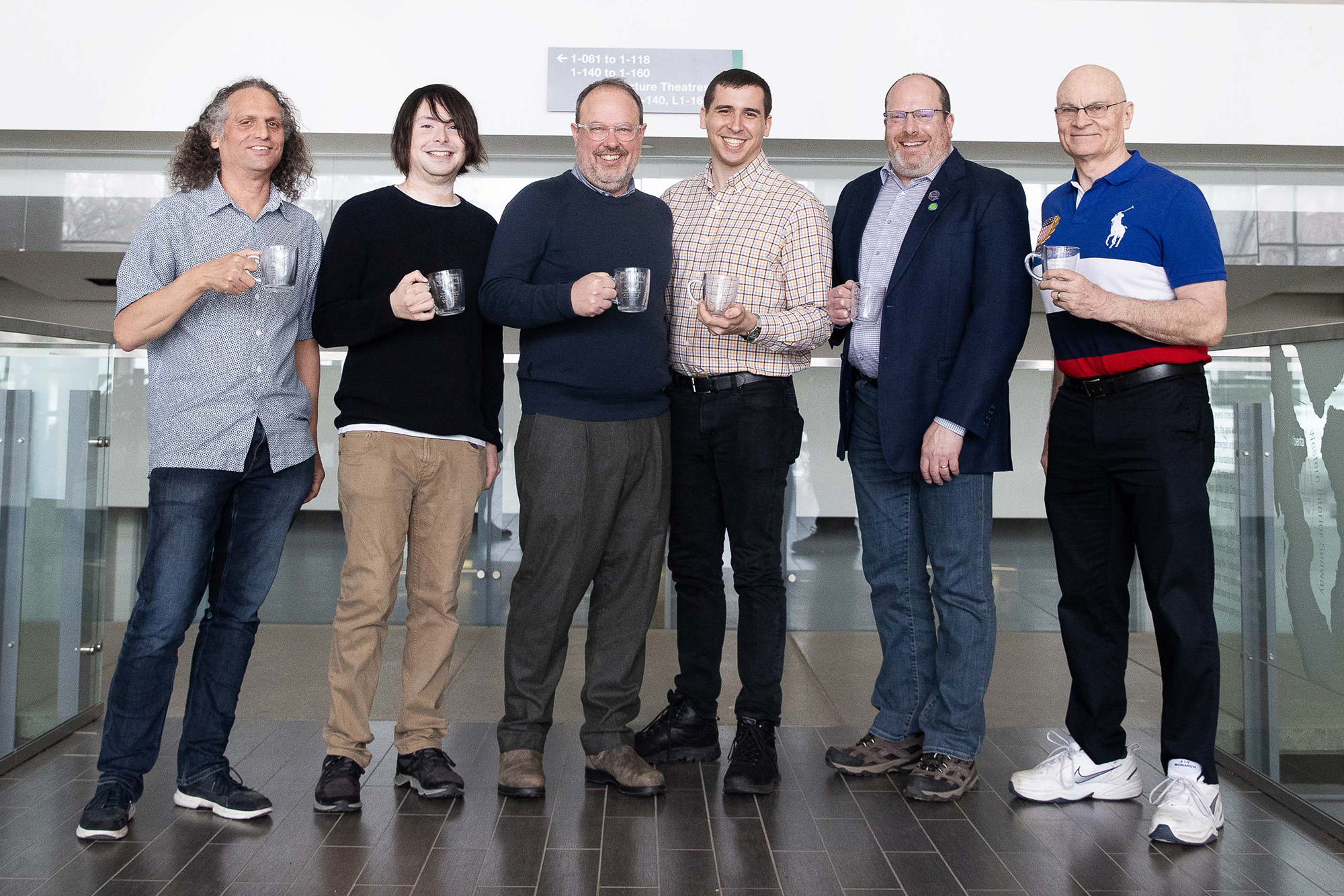
Rebekah McKinnon, Biological Sciences
This year, the The Associate Dean of Learning and Innovation Bestie (ADLIB) in the Department of Biological Sciences was awarded to Rebekah McKinnon. Rebekah's outstanding teaching was recongized by her colleagues in the department. Congratulations, Rebekah!
Jason Cooke, Chemistry
- Tell us a bit about your role. What does your day-to-day work look like?
I'm a laboratory coordinator for chemistry's senior inorganic and materials courses (CHEM 241, 333 and 343) and essentially do everything needed to run these important learning environments from designing the lab curriculum to the hands-on aspects of managing the laboratory spaces. I also supervise students in CHEM 299 (Research Opportunity Program in chemistry), which is a lot of fun as we get to investigate new ideas for experiments to bring into the courses, and I get to work closely with young, promising scientists in a direct way. When classes are in session, most of my time is spent administering and organizing the labs, mentoring and guiding TAs, managing the delivery of the eClass portion of the lab and the associated online lab manuals, and acting as a resource for students. When classes aren't in session, I'm actively engaged in making improvements based on lessons learned in the previous terms, creating new content for the labs, or sharing what we have developed, either by publishing in the Journal of Chemical Education or, more recently, contributing to the Green Chemistry Teaching & Learning Community.
- What is your philosophy when it comes to teaching the next generation of scientists?
The most critical aspect is to emphasize curiosity and problem solving. Equally important is to remind students that the laboratory drives a discipline like chemistry. Too often, students think they should be doing an experiment that illustrates or confirms something they were told in the lecture, so whenever I can, I challenge this assertion and provide inquiry-based experiments designed to show how that knowledge came to be discovered in the first place — in other words, that without laboratory work, there would be no theories tested (nor anything for their talented lecturers to speak about). Students today are different from previous generations. They bring an entirely new set of skills to the lab, especially with regards to the use of digital technologies, but also have less of what I will call practical, hands-on experience or, more simply, skills "working with things". So I have crafted our CHEM 241 (Introduction to Inorganic Chemistry) lab curriculum to build technical skills in a stepwise manner, whereas the more senior CHEM 333 and 343 labs place less emphasis on this approach and instead provide experiments that are stand-alone illustrations of important topics. Many students today seem to gravitate towards visual learning, and so I have developed an extensive library of videos and digital simulations and tutorials to support the learning process. - What was your reaction when you found out you were receiving this award? What does this recognition mean to you?
Apart from being surprised and honoured, when I discovered what "ADLIB" stood for, I smiled and thought "that's a pretty cool award". When colleagues have asked what I did to receive the nomination, I have replied "so far as I can tell, just doing my job" and so it's nice to know that my work has value to my department and the Faculty of Science.
Matthew Guzdial, Computing Science
- Tell us a bit about your role. What does your day-to-day work look like?
I'm an assistant professor and a Canada Cifar AI Chair with the Alberta Machine Intelligence Institute, so the majority of my day (around 4-5 hours) is one-on-one research meetings where I guide one of the many students in my lab through their personal research. This typically looks like a lot of discussion, editing text, and writing on whiteboards. It's a nice break when I get to teach a class for an hour! - What is your philosophy when it comes to teaching the next generation of scientists?
I love what I do, and I want to instill that passion in the students I teach. I also want to do the best I can to teach them to ensure they're as prepared as possible (and remember as much as possible) after graduation. - What was your reaction when you found out you were receiving this award? What does this recognition mean to you?
It was very heartening! The Department of Computing Science has a lot of excellent instructors, but even among them I'm a bit of an oddball in terms of my methods, so it was very gratifying to be recognized.
Neal Lamontagne, Earth and Atmospheric Sciences
This year's The Associate Dean of Learning and Innovation Bestie (ADLIB) in the Department of Earth and Atmospheric Sciences was awarded to Neal Lamontagne. Neal was recognized by the department for his excellent teaching in his role as an ATS associate lecturer. Congratulations, Neal!
Gregory Wagner, Mathematical and Statistical Sciences
- Tell us a bit about your role. What does your day-to-day work look like?
I look at my role as being to serve the university by developing excellent learning materials in statistics, and science in general, such that they are systematic, comprehensive, logical, coherent, and integrated, and then, to convey these materials to students in a way that is also systematic and logical, yet enjoyable, interactive, interesting, exciting, inspirational, and rewarding. With that approach, students thoroughly understand the material and perform very well in their studies. - What is your philosophy when it comes to teaching the next generation of scientists?
My philosophy in teaching the next generation of scientists, which is basically what I am doing when I teach this new course I developed on the Scientific Process (SCI 201), is that scientific thinking requires going back and forth between brainstorming, on the one hand, and focussing, on the other hand. So first we need to brainstorm by letting our minds go wild with creativity to search for new ideas or possibilities. This is like that quote of the year that was selected for the Celebration of Excellence which comes from Dr. Seuss: "Think left and think right and think low and think high… if only you try!"
Then, when we come up with a possible good idea or concept, we need to concentrate and focus on that one particular thing, without letting our minds go left or right, that is, we need to systematically investigate that idea, think about it logically, develop it, and test it. In the words of Alexander Graham Bell, “The sun’s rays do not burn until brought into focus.” That is the way we can solve that specific research problem.
Then, after solving one specific research problem, go back to brainstorming (thinking left and right) in order to come up with more new ideas to investigate or even to find improved ways of solving ones that we have already investigated. Then, choose another specific idea to focus on. - What was your reaction when you found out you were receiving this award? What does this recognition mean to you?
Considering all the great people there are in our department, I felt very honoured in receiving this award. This recognition means a lot to me, particularly since it appears that this may be largely due to the new course, SCI 201, which I launched in the 2024 Winter Term.
William Morrish, Physics
- Tell us a bit about your role. What does your day-to-day work look like?
I'm one of the Undergraduate Lab Coordinators for the Department of Physics. I'm typically answering student questions, training TAs, and setting up the labs. - What is your philosophy when it comes to teaching the next generation of scientists?
To me, being a scientist means being curious. You will probably always be asking "why?" To me, "why?" is a very important question. I hope that all of the physicists that go through our program continue to ask that question. - What was your reaction when you found out you were receiving this award? What does this recognition mean to you?
I was very excited to find out that I had been nominated and won an ADLIB award. Having been recognized by my department is fantastic. If this means that I'm helping to create a good experience for the students, then I'm very glad.
Jeremy Caplan, Psychology
- Tell us a bit about your role. What does your day-to-day work look like?
I'm a professor in the Department of Psychology and NMHI. My research focuses on human memory, including computational models, behavioural experiments and cognitive neuroscience (EEG and fMRI). My teaching is mostly cognitive neuroscience and memory cognitive psychology, but recently I have been working with the Replication Crisis material with both graduate and undergraduate students. - What is your philosophy when it comes to teaching the next generation of scientists?
"Philosophy" feels a bit grand to me (also "generation"). I work on a much smaller scale than that. For me, teaching and training is very individual and one-to-one. Each person is their own story. You can throw information or tasks at a person, but the person will do what they want to do, what makes sense to them. And so it should be. But you can't be totally hands-off either — after all, what is the value-added of a teacher or supervisor? In any case, I have very strong opinions about what is interesting or worthwhile (both in teaching and research), so I will give people material to start with and I'll tell them what to do at the start. But the magic happens when they push back and argue or divert things into a different direction — when they take ownership of the material or the project and personalize it.
The way I see it, I can give people behind-the-scenes information and demystify research — which are things that are hard for the student to do if they are completely self-guided. I can affirm that they are in a position to read original research articles critically and to write their own research proposals. And I can welcome them into the field and try to amplify their excitement and creative and analytical thinking skills. - What was your reaction when you found out you were receiving this award? What does this recognition mean to you?
I was surprised and very moved. Elena Nicoladis, who initiated this award, is a kindred spirit. Deanna Singhal, whose opinion means a lot to me, did a great job reinstating it. The quote she chose brings back the memory of both my parents, especially my father, who could have said it word for word himself. And the Replication Crisis course that earned me this honour really does embody the values I care about. The course material is at its core about critiquing and examining the processes and culture of research and publishing, each student situating themself within those intellectual and social contexts and conducting an applied open-science project to really take on a first-person perspective. We inevitably reach some new level of nuance and depth on the topic, and find that there are no shortcut "best practices" but rather, regular people, continuing to be fallible and struggling to do their best, just like any human endeavour. But the best thing about this topic in particular is that the students step up and really push the ideas forward and drive the discussions. It is a very light-touch way I can provide the space for each student to build their sense of legitimacy as a researcher and an active and self-reflective thinker.